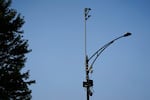An investigation by the Portland auditor into ShotSpotter’s lobbying practices in the city found insufficient evidence that the company had violated city regulations.
ShotSpotter makes gunshot detection technology and, for more than a year, has been pursuing a contract to install its devices in Portland.
The company’s sales representatives developed close ties with Portland Police Bureau leaders and members of the Focused Intervention Team, the group of officers devoted to addressing gun violence. ShotSpotter representatives helped arrange a visit to the Tampa, Florida police department for FIT officers and the civilian volunteers who work with them so the group could see ShotSpotter in action.
Related: Lobbying and lawsuits: How ShotSpotter convinced Portland to spend big on gunshot detection
The investigation into the company’s lobbying was prompted by several reports to the Portland auditor’s elections office alleging the company had failed to report its meetings with city officials.
In a letter sent to ShotSpotter, interim Portland elections officer Becky Lamboley said investigators found “clear evidence” that ShotSpotter representatives had several meetings with city officials which fall under the definition of lobbying, defined in city code as “attempting to influence the official action of City officials.”
“Our office did not find sufficient evidence that the thresholds to require registration as a lobbying entity or quarterly reporting of these meetings has been met,” Lamboley wrote in the April 3 letter to ShotSpotter.
Private companies are only required to register as lobbyists once they have spent a minimum of either $1,000 or eight hours on lobbying within a quarter.
“We do encourage you to review the entirety of Portland’s City Code Chapter 2.12 to help ensure that any future interactions you have with City Officials will avoid potential Lobbying violations under our City Code,” Lamboley wrote.
In a statement, Sam Klepper, a senior vice president at ShotSpotter, said the company is confident it did not violate any regulations but understands the need to ensure rules are followed.
Klepper said ShotSpotter “takes lobbying regulations very seriously.”
“We take every precaution and measure to ensure we are complying with all local policies for the cities we are employed in,” Klepper said.
ShotSpotter was fined $5,000 by the Oakland Public Ethics Commission for violating the city’s lobbying laws. The illegal lobbying happened in 2014 after the Oakland police chief questioned ShotSpotter’s usefulness and said the money was likely better spent elsewhere.
Interest in ShotSpotter has grown among Portland officials even as evidence has continued to mount that the technology doesn’t deliver the 97% accuracy rate the company claims. One independent investigation found 89% of ShotSpotter alerts fail to turn up evidence of a gun-related crime. A Chicago inspector general’s investigation found that of 42,000 ShotSpotter alerts police responded to, only 9% led police to evidence of a gun-related crime.

A file photo of ShotSpotter equipment overlooks the intersection of South Stony Island Avenue and East 63rd Street in Chicago on Tuesday, Aug. 10, 2021. A Chicago inspector general’s investigation found that of 42,000 ShotSpotter alerts police responded to, only 9% led police to evidence of a gun-related crime.
Charles Rex Arbogast / AP
The company disputes the claims about the inaccuracy of its technology and said human intervention is a “positive check on the algorithm.”
Last month, the police union president in Albuquerque called ShotSpotter a $3 million “big fat waste of money.”
Several cities have dropped ShotSpotter in recent years, including San Antonio, Charlotte and Trenton, New Jersey. In October, police in Dayton, Ohio chose not to renew their contract, saying it would be tough to show how effective ShotSpotter has been at reducing crime. In December, the Seattle city council opted not to fund a $1 million proposed pilot and the month prior, the Atlanta police rejected ShotSpotter after the company gave the city a free six-month trial. It’s the second time Atlanta police have rejected ShotSpotter, saying in 2018 the ShotSpotter sensors duplicated gunshot alerts and aren’t worth the high price tag.
Portland initially planned to award ShotSpotter a contract to launch a gunshot detection pilot in the city without opening up the process to competitive bids. In January, Wheeler backed away from that plan and the city solicited proposals from several companies vying for the contract.
The investigation into ShotSpotter’s lobbying activities came to light in February, just four days after the bid submission window closed. According to public records, at least four companies submitted bids.
The timeline included in the request for proposals anticipated having the top two companies present to the public in mid-February and a selection made by the end of that month. It said installation would begin April 1. None of those steps have happened yet.
On Tuesday, Wheeler spokesperson Cody Bowman said that Wheeler appreciates the auditor’s investigation and that the selection process is ongoing. He said next steps will be announced “in the near future.”
